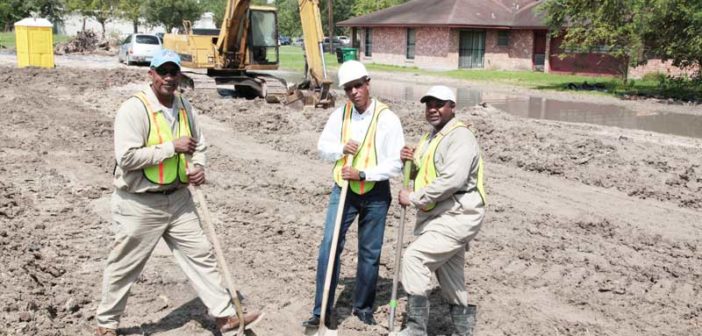
A disparity study determines whether a government entity, either in the past or currently, engages in exclusionary practices in the solicitation and award of contracts to minority, women‐owned, and disadvantaged business enterprises (MWDBEs). This study can help determine if there is disparity between the availability of firms and the utilization of those firms in its market area.
Opening the Door Statewide for Equity and Economic Opportunity for Minority Businesses
It was recently announced that a $200,000 Disparity Study Fund developed by Harris County Commissioners Rodney Ellis and Adrian Garcia will help entities implement a Minority- and Women-Owned Business Enterprise (MWBE) program. Funded by Commissioners Ellis and Garcia, this program, already receiving support from school district and community college officials, could lead to entities beyond this region adopting and expanding MWBE programs that can open the door statewide for equity and economic opportunity for minority businesses.
Below is the recent press release (1/20/22) from the Office of Commissioner Rodney Ellis:
Officials with Lone Star College System and Alief school district said Wednesday they support using a $200,000 Disparity Study Fund that Harris County Commissioners Rodney Ellis and Adrian Garcia developed to help such entities implement a Minority- and Women-Owned Business Enterprise (MWBE) program.
Carlecia Wright, Chief Diversity Officer for Lone Star College System, which 60 percent of its students are of color, said disparity studies are required by law to legally implement a MWBE program.
“That is why Lone Star is committed to doing a disparity study and making sure we implement a program that is race and gender conscious so that we can create opportunities not just for our community,” she said, “but for our future community and for students who inspire to be entrepreneurs.”
Commissioners Ellis and Garcia are speaking to school district and community college boards in Harris County to convince trustees to take advantage of the fund, which Commissioners Court approved in November.
“We are going to go to every school district and community college in our region and say, ‘you ought to do more than just march in a (Martin Luther King Jr.) parade and read the I Have a Dream speech. You ought to give every student at your community college and your public schools the opportunity to build the schools that they attend,’ ” Commissioner Ellis said, referring to minority and female students who could become contractors.
Said Commissioner Garcia: “There’s a lot of strong talk when it comes to celebrating our diversity, but all too often, entities don’t put their money where their mouth is. So, I challenge every educational institution in our region to recognize that when you do disparity studies, you are bringing others to the table. You got to give them the opportunity. So I’m simply saying to every decision maker at every institution from Houston Community College to Lone Star, to San Jac (San Jacinto College), to U of H (University of Houston), to school districts across our region, give people an opportunity.”
As part of the program, the Office of County Administration will work with the County Attorney’s Office, the Purchasing Department, and the Department of Economic Equity and Opportunity to create a fund for community colleges and school districts in Harris County to conduct disparity studies to determine if MWBE’s are being utilized.
Participating institutions will be required to create and adopt MWBE programs using national best practices to remedy any race and gender disparities identified. Although Harris County is providing seed money, the participating entities will be responsible for most of the costs.
Public entities cannot create a race-conscious MWBE program without first performing a disparity study. Commissioner Ellis initiated Harris County’s disparity study and asked the Port of Houston and the Metropolitan Transit Authority to conduct similar studies. Each disparity study indicated that MWBE’s were not well represented in the procurement process.
Harris County’s study, for example, showed only 9.1% of the contract dollars go to MWBEs, even though there are many more MWBEs in the region who could meet the County’s procurement needs. Black-owned businesses hold .5% of the contracts offered; Hispanics hold 4.6%; Asians hold .6%; Native Americans hold 0.1%; and White women hold 3.2%.
Multi-jurisdictional disparity studies allow multiple funding partners to pool their financial resources together to conduct and study across various entities. The county’s fund will provide seed funding for participating entities to pool their financial resources together for a multi-organizational study.
Harris County Attorney Christian Menefee said African American-, Latinx-, Asian- and women-owned businesses are just as qualified to receive government contracts. He thanked Commissioners Ellis and Garcia for funding the program.
“The more time you spend around Commissioner Ellis, you learn that the buzz word is equity,” Menefee said. “What’s important about today is this is Commissioner Ellis and Commissioner Garcia not just using the word but putting their money where their mouth is by taking meaningful steps to provide access to minority-owned businesses.”
Ann Williams, Alief ISD Board President who said she was representing herself at the Wednesday news conference, said school districts across Texas approve almost $5 billion in bonds in November. Now, school board members are faced with trying to develop equity policies.
“We are putting them in place because we want to make sure that our students have access to equitable education,” Williams said. “But what good is it to educate our students and give them access when those who want to work as entrepreneurs or want to become developers … have no opportunity when they graduate.”
State Rep. Ron Reynolds, who is joining Commissioners Ellis and Garcia in their meetings with college and school district boards, said disparity studies are needed “so we can show in black and white what the numbers are, not what you think they are.
“Not what someone said they were or what you want them to be,” he added. “What they are – facts matter. And the facts are that minorities who are competently qualified and can do the work are historically left behind … because they (decision makers) use the excuse of experience.”
Bishop James W. Dixon, President of the Houston NAACP, agrees.
“Democracy is threatened because the great percentage of wealth is in the hands of a few people,” Bishop Dixon said. “The wealth gap exists because of the disparity as it relates to economic opportunity. We are now going for a disparity study. Why is it that this is the first time that there has ever been a disparity study in so many of the public agencies?”
Carlecia Wright is the Chair of the Subcontractors USA Advisory Board and the first Chief Diversity Officer of Lone Star College. In this leadership role at Lone Star, she serves as a key member of the administration providing system wide support for recruitment, implementing policies and programs, as well as developing community partnerships that foster equity and inclusion for students, faculty, and staff. Also with previous experience having served as the mayoral appointed Chief Diversity Officer and Director under Mayor Annise Parker and Mayor Sylvester Turner, she has great insight on diversity studies and what this program means for Houston and the state.
Q&A With Carlecia Wright:
Explain to our readers what this disparity study means for MWBEs? Commissioners Ellis and Garcia have been and remain true advocates for MWBEs. Commissioner Ellis challenged entities to conduct disparity studies after seeing what the county was spending and that some entities funded with public capital don’t have MWBE programs. This study will help hold entities accountable, illuminating minority businesses in their areas that can provide the services they need, also validating MWBEs in the marketplace. Entities collecting taxpayer money, but not doing business with the community should have a MWBE program in place. Developed in 2015 by Chancellor Dr. Stephen C. Head, Lone Star already has an active diversity program, but this diversity study will help us track how impactful the program is, also helping us evaluate how we can expand our efforts to do more business with MWBEs. With this proactive program developed by Commissioners Ellis and Garcia, this is a pipeline for our students to succeed as entrepreneurs.
How can this disparity study fund be impactful for our state? As Lone Star College is the largest college in the region and one of the fastest-growing community colleges in the nation, being one of the entities leading the charge and taking on this leadership role is momentous. We are hopeful that many will respond to the call of action set by Commissioners Ellis and Garcia. Some of these entities look at the best practices of their counterparts. Once the results are seen regionally, one can be hopeful about seeing entities conduct disparity studies statewide, with the implementation and expansion of MWBE programs to further the advancement of minority businesses.
For more information about the disparity study and program, please contact the Office of Commissioner Ellis at www.hcp1.net and Commissioner Garcia’s Office at www.hcp2.com. And for more about Carlecia Wright and Lone Star College’s diversity program, please visit www.lonestar.edu.
Source:
www.houstontx.gov







